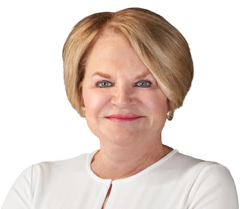
Getting Stuff Done and Finding Happiness Along the Way: A Conversation with Healthcare Marketing Leader Jean Hitchcock
James Gardner, Healthcare Strategist, recently met up with Jean Hitchcock, the founder of Hitchcock Marketing & Communications and a senior advisor at Aloysius Butler & Clark, whose career spans three decades at some of America’s leading healthcare systems. Their conversation explored marketing from the “outside in,” what retail health means for hospitals, and how to embrace career evolution. This is the fourth in a series of articles celebrating the journeys, insights, and successes of select healthcare marketing leaders.
Healthcare marketing is undergoing a seismic shift. Simply put, we’re moving from promoting services and managing reputations to embracing a broader understanding of all that brand means. More and more, we’re adopting the mantra “a brand is a promise delivered,” and taking ownership over key functions that help us deliver that promise.
This is a constant theme throughout my conversations with healthcare marketing leaders, including the legendary Jean Hitchcock. Jean’s career spans more than 25 years at some of America’s most-respected healthcare systems, including OhioHealth, MedStar Health in Maryland, and Scripps Health in San Diego, where she worked with Don Stanziano, now at Geisinger. Like many, I’m deeply inspired by Jean’s expansive vision for the role of marketing — and how it impacts every corner of a health system and its patients.
“I Want To Be Part Of This”
Jean's journey into the field began, as it did for many of us, with a personal connection. “My epiphany happened many years before I got on the job,” she recalls. “I come from a large family of six, and my brother was gravely injured in 1988. I was fully immersed in trauma care and ICUs.”

That experience marked a turning point for Jean. “I saw what the hospital team did for my brother, which is what they did every day, for everyone who walked in that door,” she says. “I thought, I want to be part of this. After that, I knew I'd be in healthcare the rest of my life.”
She took a slight detour, though, earning degrees in political science and sociology, and ultimately a master’s in public administration. Her healthcare career began in Grand Rapids, Michigan, first working with people with disabilities and later with the area’s major health system—initially known as Butterworth, then Spectrum, and now Corewell. “I was there when they became a system, and it was a great training ground for everything that came afterward,” Jean says.
One of the lessons Jean learned early on was to work closely with physicians. “In healthcare, if you're not a lifelong learner, you're just not going to keep up,” she says. “When I was at Spectrum (now Corewell), I sat in on something like 100 surgeries. And I was fascinated. When you take away all the extraneous stuff from healthcare, the clinicians are just trying to do the best thing for the patient. And how can you not admire that goal?”
For Jean, there’s a direct line between those noble elements of healthcare and the role of marketing. “My whole thing was to bring the voice of the consumer to those conversations, and then the second thing was to support the doctors as much as possible,” she says.
If there was a third thing, it might be good old-fashioned elbow grease. “I had business cards done that had the whole laundry list of initials,” Jean says with a laugh. “One of the doctors says to me, ‘What's this one stand for?’ I go, ‘It stands for nothing. I just have to have as many initials as you do.’ Of course, it did stand for something, but I was teasing them, right? And then a good friend of mine said, you should have three initials after your name: GSD, for ‘get stuff done.’ So then I made new cards with that tagline.”
Those years were also formative for Jean’s leadership skills. “Starting at Scripps, I’ve had my teams create our ‘10 Commitments’ to each other,” she recalls. “They came up with them, and we had to live by them, as part of their performance reviews. Humor was in there, truth was in there, and so was ‘do what you say you're going to do.’ It makes working easy because everyone's operating off the same platform. It's our contract with each other.”
Between OhioHealth and Scripps Health, Jean spent a five-year stint as a marketing agency consultant with more than 70 clients, including academic medical centers, multi-hospital systems, physician groups, and community hospitals. At the same time, she made her foray into teaching, with a healthcare communications course at Northwestern University’s Kellogg School of Management. “I always tell people I got my MBA in marketing at the same time,” she says with a laugh.
Optimizing For The Happiness Factor

By 2014, Jean had about 80 people reporting to her as Corporate Vice President of Public Affairs and Marketing at MedStar Health, an $8 billion system. While Jean had always relished working at an unrelenting pace, it was time for some soul searching.
“Looking back, this time in my life was part of the maturing process,” Jean says. “I’d lived all over the country, and I wanted to focus my time and energy on things that were important to me and that changed the happiness factor in my life. I was too young to retire, but I wasn't going to go back on the provider side and work 60 hours a week. I wanted a change.”
Anyone who knows Jean knew she wouldn't be content simply stepping back. If anything, she’s simply channeled all her expertise into new, equally rewarding pursuits—including a thriving consultancy, Hitchcock Marketing and Communications.
“During the COVID pandemic, interim staffing became a huge part of my company, which I hadn't anticipated,” she says. “Two of my staff were working almost full time in comms with a big health system out of San Francisco. I was getting calls from other healthcare leaders, saying ‘It's going to take us six months to find somebody. Can you come here?’ And so, all of a sudden, I'm doing interim staffing, which I loved.”
Post-pandemic, Jean recently wrapped up a two-year contract position with Phoenix Children's Hospital as VP, Marketing, Communications and Physician Relations. She was also named a Senior Healthcare Advisor with Aloysius Butler & Clark, where she’s creating a ‘Healthcare Marketing MBA in a Day’ course. She’s even working on a book, which has already been accepted by a publisher.
As an in-demand expert, Jean has the privilege of vetting every opportunity, both professional and personal, to ensure it aligns with her values in life. “Time is the most precious resource we have as human beings,” she says. “I try to use mine very wisely and on the things that are important to me, and it took me a while to get to that.”
Finding Purpose At Every Step
Now that she’s here, Jean continues to find purpose in mentoring and advising fellow healthcare marketers. “I’ve been developing this concept of taking a look at healthcare marketing from the outside in, versus inside out,” she says.
She explains: “The old way of doing things is, the CMO gets their budget and decides who gets all the money—heart, orthopedics, that type of thing. But if you flip the lens and look from the outside in, we could have some real change. And that change would shape what marketing does. We spend time on stuff that we shouldn't be in, and not the stuff that really could make a difference for patients.”
Jean recalls a practical example. “I used to cringe when they would put breast centers in the basements of hospitals because that's where they had room. Is there anything more ominous? Or they think, we own this piece of land, so let's put something there—but it's the worst possible place. If you want to find out where to place a facility, go talk to the local grocery store, because nobody does site planning better.”
Jean continues, “If I was in charge of marketing at Coca-Cola, my job would be to sell more Coca-Cola. So, why aren’t we using the same business attitude about healthcare marketing? Our job is to grow, retain business, and eliminate issues relative to growing or retaining the business on the outside. Our role is to make the patient experience as good as it can be by bringing the consumer's voice to the deliberations.”
On the topic of consumerism, I was particularly interested to hear Jean’s opinion on retail health—something I’m an enthusiast about. What does she think of entrants like Walmart, Walgreens, CVS, Amazon, Dollar General, and Costco?
“You’ll never hear a patient call them a disruptor,” she points out. “What patients are going to say is, ‘They heard what we wanted and they came and answered the need.’ It’s us who have myopia around that. We should have gotten our act together. They wouldn't have been in business if we had fixed access, if we had done more urgent care. If we had established a presence in grocery stores. So I think they're just answering a need. Of course, many of these newer offerings are going through consolidation—but ultimately I think it's great for patients.”
Like the other healthcare marketing luminaries I’ve talked with, Jean’s focus on those business fundamentals has earned her a prominent seat at the table. “When I started my career, I interviewed 60 CEOs to create a white paper,” she recalls. “I asked them what they thought of marketing. Many of them had MBAs, so they knew what marketing can do, but they'd never seen it happen in healthcare.”
Jean continues, “The one quote I took from that, which I say to everybody, is ‘I’ve never had a marketing lead tell me they could help me meet my bottom line.’ You’re never going to be at the table if all you’re ever talking to the CEO about is brochures and PR shoots, or something like that. You've got to show them that you're part and parcel of the business.”
The Basics Of Getting Stuff Done
Throughout our conversation, I was struck by the degree to which Jean is a pragmatic marketer who represents the new wave of thinking in our field. In her view, marketing should adopt a much broader remit—from improving the patient experience to solving healthcare’s talent shortage. New tools, whether augmented reality or generative AI, are simply tactics to deploy in service of those bigger needs.
“In a previous role, I remember talking to a neurosurgeon who had tried to apply online and told us that our system had crashed twice on him,” she says. “For someone looking to make sure he’s going to an organization with the latest equipment, this wasn’t a promising sign.”
The lesson? “Every time you touch somebody, it tells them something about the brand,” Jean explains. “At the same time, if you only focus on the brand, you can miss an opportunity to be part of the operations. You might be putting something out there that doesn’t ring true to patients. That’s when you find out real quickly that you should have been paying attention to the basics.”
Spoken like a true expert at “getting stuff done” —one whose opinion we’ll be seeking out for years to come.
(Thanks to Jean Hitchcock for her kind collaboration.)